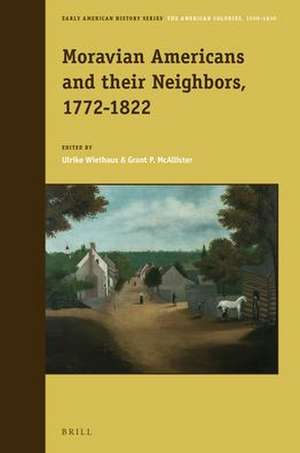Moravian Americans and their Neighbors, 1772-1822: Early American History Series, cartea 13
Editat de Ulrike Wiethaus, Grant McAllisteren Limba Engleză Hardback – 30 noi 2022
Through their multidisciplinary approach, the authors convincingly argue that Moravians encouraged assimilation, converged with core values and political forces of the Early Republic, but also contributed uniquely Moravian innovations. Residual, newly dominant, and increasingly subjugated discourses among Moravians, other European settlers, Indigenous nations and free and enslaved communities of color established the foundations of a new Moravian American identity.
Contributors include: Craig D. Atwood, David Bergstone, David Blum, Stewart Carter, Martha B. Hartley, Geoffrey R. Hughes, Winelle Kirton-Roberts, Grant P. McAllister, Thomas J. McCullough, Paul Peucker, Charles D. Rodenbough, John Ruddiman, Jon F. Sensbach, Larry E. Tise, Riddick Weber, and Ulrike Wiethaus.
Preț: 757.43 lei
Preț vechi: 923.70 lei
-18% Nou
Puncte Express: 1136
Preț estimativ în valută:
144.98€ • 157.53$ • 121.86£
144.98€ • 157.53$ • 121.86£
Carte indisponibilă temporar
Doresc să fiu notificat când acest titlu va fi disponibil:
Se trimite...
Preluare comenzi: 021 569.72.76
Specificații
ISBN-13: 9789004291294
ISBN-10: 9004291296
Pagini: 488
Dimensiuni: 155 x 235 mm
Greutate: 0 kg
Editura: Brill
Colecția Brill
Seria Early American History Series
ISBN-10: 9004291296
Pagini: 488
Dimensiuni: 155 x 235 mm
Greutate: 0 kg
Editura: Brill
Colecția Brill
Seria Early American History Series
Notă biografică
Ulrike Wiethaus is professor emerita at Wake Forest University. Her research interests focus on the history of Christian spirituality with an emphasis on gender justice and political history, and most recently, historic trauma and the long-term impact of US colonialism.
Grant Profant McAllister, Jr. is an associate professor of German literature and a Levison Faculty Fellow at Wake Forest University. His research interests focus on eighteenth century aesthetic theory, romanticism, and subjectivity and most recently, on Moravian communities in the early years of the Republic.
Grant Profant McAllister, Jr. is an associate professor of German literature and a Levison Faculty Fellow at Wake Forest University. His research interests focus on eighteenth century aesthetic theory, romanticism, and subjectivity and most recently, on Moravian communities in the early years of the Republic.
Cuprins
Acknowledgements
List of Illustrations
Notes on Contributors
1 Introduction: Southern Moravians, Their Neighbors, and Processes of Americanization in the Early Republic
Grant Profant McAllister and Ulrike Wiethaus
2 The American Plan of Zinzendorf and Spangenberg
Craig Atwood
3 The Transformation of Wachovia: From Anglican Protectorate to Moravian Preserve
Larry E. Tise
4 Black People - White God: Moravianism and the “Cultural Purification” of the Afro-Caribbean in Antigua and Tobago
Winelle Kirton-Roberts
5 An Archives of Truth: Moravian Recordkeeping and Archival Selection
Paul Peucker
6 Traugott Bagge as a Historian of the American Revolution
John A. Ruddiman
7 Early Performances of Haydn’s Creation in the American South: The Moravian Connection
Stewart Carter
8 From Innovation to Imposition: Changing Understandings of the Single Sisters Choir in Salem from 1772–1822
Riddick Weber
9 “The Spirit of Freedom in the Land”: From Immigrants to Americans in the Moravian Experience
Jon Sensbach
10 Moravians and the Celebration of American Figures and Holidays, 1776–1826
Thomas J. McCullough
11 Moravian Architecture Becomes Southern
David Bergstone
12 The Americanization of Moravian Music: An Examination of the Salem Manuscript Books
David Blum
13 Becoming American in Salem’s Congregation Pottery
Geoffrey Hughes
14 The Changing Landscape of Slavery in Salem and its Legacy
Martha Hartley
15 Rejection of the Baptized: Moravians and Slavery
Charles D. Rodenbough
16 The Moravian Easter Morning Services from 1772–1822: Easter and the Birth of American-Moravian Identity
Grant Profant McAllister
17 Becoming American at the Moravian Missions in Springplace and Oothcaloga
Ulrike Wiethaus
Index
List of Illustrations
Notes on Contributors
1 Introduction: Southern Moravians, Their Neighbors, and Processes of Americanization in the Early Republic
Grant Profant McAllister and Ulrike Wiethaus
PART 1: Foundations
2 The American Plan of Zinzendorf and Spangenberg
Craig Atwood
3 The Transformation of Wachovia: From Anglican Protectorate to Moravian Preserve
Larry E. Tise
4 Black People - White God: Moravianism and the “Cultural Purification” of the Afro-Caribbean in Antigua and Tobago
Winelle Kirton-Roberts
5 An Archives of Truth: Moravian Recordkeeping and Archival Selection
Paul Peucker
PART 2: Convergences
6 Traugott Bagge as a Historian of the American Revolution
John A. Ruddiman
7 Early Performances of Haydn’s Creation in the American South: The Moravian Connection
Stewart Carter
8 From Innovation to Imposition: Changing Understandings of the Single Sisters Choir in Salem from 1772–1822
Riddick Weber
9 “The Spirit of Freedom in the Land”: From Immigrants to Americans in the Moravian Experience
Jon Sensbach
PART 3: Innovations
10 Moravians and the Celebration of American Figures and Holidays, 1776–1826
Thomas J. McCullough
11 Moravian Architecture Becomes Southern
David Bergstone
12 The Americanization of Moravian Music: An Examination of the Salem Manuscript Books
David Blum
13 Becoming American in Salem’s Congregation Pottery
Geoffrey Hughes
PART 4: Segregation
14 The Changing Landscape of Slavery in Salem and its Legacy
Martha Hartley
15 Rejection of the Baptized: Moravians and Slavery
Charles D. Rodenbough
16 The Moravian Easter Morning Services from 1772–1822: Easter and the Birth of American-Moravian Identity
Grant Profant McAllister
17 Becoming American at the Moravian Missions in Springplace and Oothcaloga
Ulrike Wiethaus
Index











